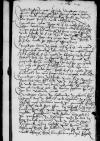Dem hochwirdigsten in Gott fursten unde hern, hernn Iohanni, von ⌊Gotis genaden des loblichen stichts Ermelant bisschove⌋ etc., meynem genedigen hochgelibtenn hernnn.
Hochwirdigster in Gott Furste, Genediger Herre, Ewer Furstlichen Genoden szeynth meyne gehorszame unde gancz berethwylligen dynste zcuvorannn alle zceytt zcu thun / unde enthpholennn.
Genediger Herre.
Bytte Ewer Furstlichen Genoden welle ssych nicht losszen vorlangen noch dem weyne allekanth. / Ich hoffe in / vor Osteren zcu erlangen. Ich kans nicht besszeren / unde schycke Ewer Furstlichen Genoden eyn schock garangennn eppellen, szo guth all szy szeyn, / das nowge vom jore. / Bytthe Ewer Furstlichen Genoden welle szy geszunth esszennn.
Genediger Herre, ich bytthe noch Ewer Furstlichen Genoden als meynen groszgunstigen, genedigen lyben hernnn vor meynen swoger ⌊Hans Holsten⌋, Ewer Furstlichen Genoden welle in besczutczen unde hanth habennn, das her in szeynen szachen en moll zcum gutten ende komen muchte, das her doch szo gancz unde gaer ausz all szeynen dingen nicht queme, unde why men myth im gehandelt hott. / Bytthe Ewer Furstlichen Genoden welle ⌊Jorgen Ravenwalt⌋ dorumme fragen. / Es mag Gothe erbarmen. /
Genediger Herre, ich schicke Ewer Furstlichen Genoden nowge zceytungen von ⌊keyserlicher mayestet⌋, dy in ⌊Dancken⌋ gekomen ist unde bynne n VIII tagen gedruckt ist worden. / Der almechtige Gott, der vorley szeyner ⌊keyserlicher mayestet⌋ vor dan victoria, amen.
Genediger Herre, dy Hollander, dy gekomen szeyn, / szagen, das in ⌊Hollant⌋ unde ⌊Szelant⌋ dy grosten schyffe myth ordinancie worden zcu gemacht, / ⌊keyserlicher mayestet⌋ zcu gutte. Unde szeyn schon LVI schyffe ausz ⌊Szelanth⌋ auszgeloffen / unde wyndes halben waren wydder ingekomen / unde szollen szygelennn zcu ⌊Perszolonnn⌋ in ⌊Spannien⌋ unde do das reszigen zceugk innemen. / Unde in ⌊Hollant⌋ szeynnn zcugericht XLIIII schyffe unde konnen nicht boszlowte krygen, derhalbennn das szy den weyten weck beszorgen kegen ⌊Constantinopel⌋ zcu
szÿgelen
.
Auch wyrth geszageth unde och geschryben a[usz] ⌊Hollanth⌋, das ⌊keyserlicher mayestet⌋ personlich wyrth myt[h] intrettennn zcu ⌊Persolonn⌋. Der almechtige Gott gebe im gluck unde hell uns Cristen zcu beschutczen unde zcu beschyrmennn.
Genediger Herre, ⌊meyne hauszfrowe⌋ leth Ewer Furstlichen [Genoden] fruntlichen grusszennn. Domytthe ich Ewer Furstlichen Genoden de[m] almechtigen Gothe bevolen habe myth gluckliche[m] unde fridlichem regimente unde langweriger geszuntheytt.


